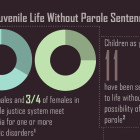
Life Without Parole for Juveniles: A Brief Look at the Issues
|
Tuesday the Supreme Court will take up the issue of life sentences without parole (LWOP) for juveniles convicted of murder. In 2010, the nation’s high court ruled juvenile LWOP sentences were unconstitutional in non-homicide crimes. Now, advocates are hopeful the court will extend the same protection to all juveniles, regardless of the offense. Pointing to research indicating that brains continue to develop into the early 20s, some groups, including the American Bar Association, argue juveniles are uniquely suited to rehabilitation and that a life sentence without the possibility of parole is a violation of the Eighth and 14th Amendments’ prohibition against cruel and unusual punishments. Juvenile LWOP sentences are, in fact, very rare, especially for 14-year-olds, the age of both juveniles sentenced in the two cases before the court.







